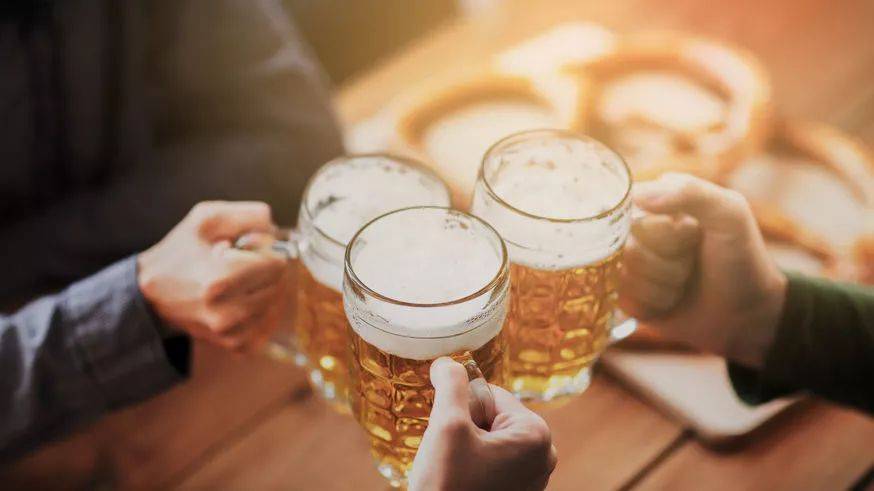
You must have heard the saying [moderate drinking is good for health].
Unlike the notorious cigarette, alcohol, which is a category 1 carcinogen, always exists as a “health protector”.
For example, the well-known red wine (wine) has always been said:
- Red wine is rich in resveratrol, anthocyanin and other active ingredients, and has antioxidant, anti-aging and anti-cancer effects. Drinking a little red wine every day is also good for the heart, softening blood vessels and preventing coronary heart disease.
However, in medical professional institutions, red wine has never been recommended to the public as a positive image.
The American Society of Clinical Oncology (ASCO) clearly points out that alcohol is an important carcinogenic factor.
Eh, what about the agreed [moderate drinking is good for health]?
One out of every 18 cancers is [drunk]
The World Health Organization has long listed alcohol (beverages) as a category 1 carcinogen.
You know, 5.5% of cancer occurrences and 5.8% of cancer deaths in the world are caused by alcohol. In other words, one in every 18 cancers is drunk.
Drinking alcohol is directly related to common breast cancer, colorectal cancer, liver cancer, esophageal cancer, gastric cancer and pancreatic cancer. Of course, the types of cancer most closely related to alcohol come from tissues that drink directly contact-such as oral cancer, laryngeal cancer, esophageal cancer, etc.
In addition, women should not drink alcohol in particular, because the risk of alcohol to women seems to be greater than that of men. Data show that 16.4% of women’s breast cancer in the United States is related to drinking alcohol.
Some people may want to ask, is it because you drink too much that you have a problem? Doesn’t drinking less have any health care effect?
Drinking a small amount of alcohol can also be harmful to health.

[Drinking a small amount of wine, especially a little red wine, is good for the heart (body).] This statement is indeed very popular, but it is actually unreliable.
There are two reasons why it is unreliable:
1. Contradictory research
There are indeed some early reports that drinking a small amount of red wine can reduce the incidence of cardiovascular diseases and even mortality.
However, recent larger-scale tests have not confirmed this conclusion. On the contrary, there is evidence that people who do not drink alcohol at all are less likely to suffer from coronary heart disease, stroke and other diseases than people who drink a small amount of alcohol.
For this reason, the authoritative American Heart Association (AHA) has given a clear warning-it does not recommend anyone to start drinking on the grounds of [reducing the risk of coronary heart disease].
2. Want [drink] the legendary benefits? Almost impossible
Many theories that wine is good focus on resveratrol, anthocyanin, tannin and other antioxidants, but in fact, a simple look at the data shows that the content of these substances in wine is pitifully low. If you want to drink a dose that produces magical effects, you may have already died.
Other studies have shown that the cancer risk of the so-called [healthy red wine] (wine) is no different from that of other wines.
Also this year, a data analysis of more than 12 million women found that even if they drink only a small glass of wine a day [moderate drinking], the probability of breast cancer among women will increase significantly.
In addition to red wine, the health risks of drinking other wines also exist for the simple reason that the most important ingredient of the best wine is always alcohol.
Perhaps everyone is even more confused here. Since drinking is not good, where does the phrase “moderate drinking” come from?
Is it made up to harm people?
Drinking moderately is a persuasion to adults.

Moderate drinking, the relatively authoritative and famous source is the 2015 edition of the American Dietary Guidelines. The above words are directly translated as-moderate drinking for adults.
However, the guide does not finish with a one-sentence summary. After that, there are 500 pages of reports that elaborate on it.
The report points out that alcohol is a very special component of diet. It is a cultural element and a necessity for some social activities.
European and American people are too accustomed to drinking, and there are not a few people who drink too much or even have alcohol addiction. For the sake of making it easier for everyone to accept and implement, the government only gives the suggestion of “moderate drinking for adults”.
Therefore, moderate drinking is said to people who need to drink or have drinking habits. It focuses on different health goals and is a second best persuasion.
If moderate drinking is definitely not a good suggestion from the perspective of cancer prevention or disease prevention, the more effective and simpler method is always-not drinking.
Drinking alcohol in China is more likely to cause cancer.

To explain this problem, we have to start with the principle of alcohol carcinogenesis.
In fact, alcohol itself will not cause gene mutation and will not directly cause cancer. What is really dangerous is acetaldehyde, the metabolite of alcohol in human body.
After alcohol (ethanol) enters the body, it is metabolized into acetaldehyde by alcohol dehydrogenase, and then metabolized into acetic acid by acetaldehyde dehydrogenase and discharged out of the body.
Ethanol is alcohol, the source of drinking [cool], which leads to illusion of drunkenness because of it, and drunk driving is also checked by it. Acetic acid can be understood as [vinegar] and has no toxic or side effects.
However, acetaldehyde, an intermediate metabolite, is a definite carcinogen.
It is for this reason that the World Health Organization has listed alcoholic beverages and acetaldehyde as Class I carcinogens with the most conclusive evidence.
Then why do Chinese people say that drinking is more likely to cause cancer?
Because the Chinese have defects in alcohol metabolism genes.
As long as people have lived abroad, they will find that drinking is a characteristic of China (East Asians). Foreigners who drink do not blush as easily as Chinese.
The root cause of blushing after drinking is that Chinese people often carry mutant acetaldehyde dehydrogenase gene, which leads to the inability of human body to effectively degrade acetaldehyde. Accumulation of acetaldehyde in the body can lead to vasodilation, which looks like blushing and swelling tendons, forming the phenomenon of “drinking on the face”.
Some studies of East Asian populations have found that people with aldehyde dehydrogenase gene defects are more likely to suffer from cancer after drinking than people without defects.
That is to say, the Chinese have suffered from birth, even if they drink moderately, in the case of cancer caused by drinking.
If you blush when drinking like me, it means that the risk of cancer is higher. Please drink less. After all, genes (congenital) are not effective.
